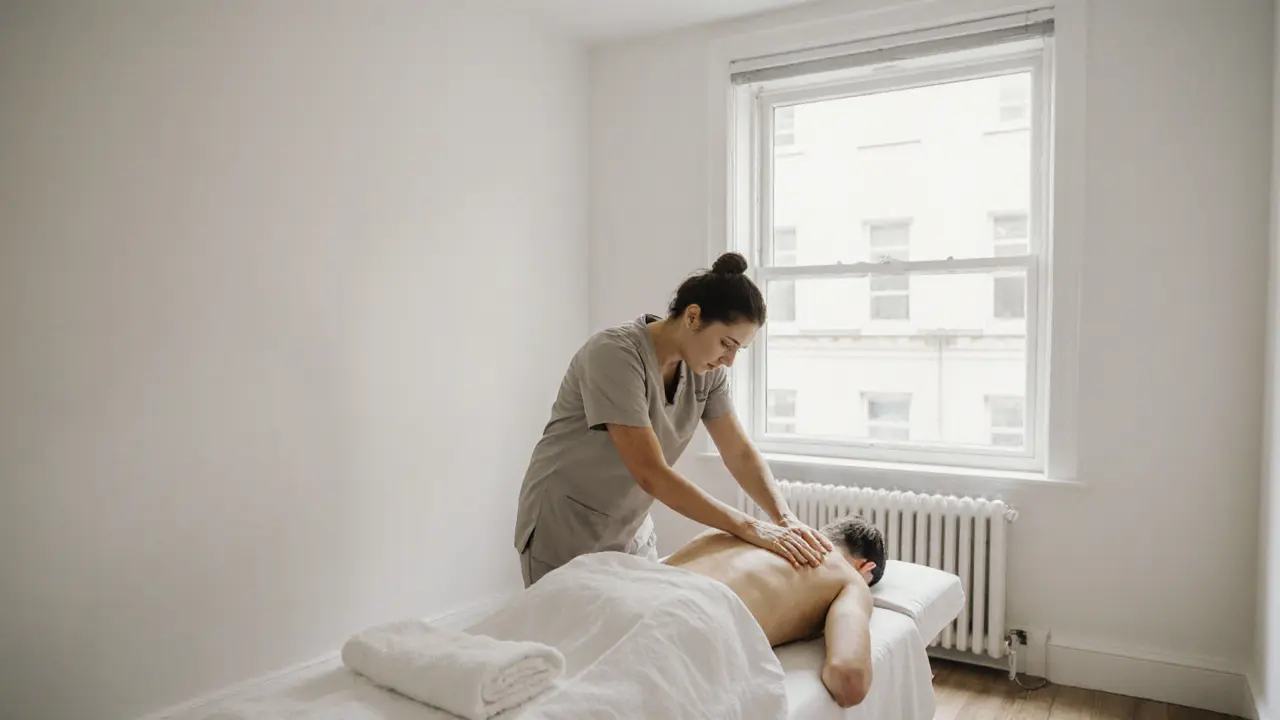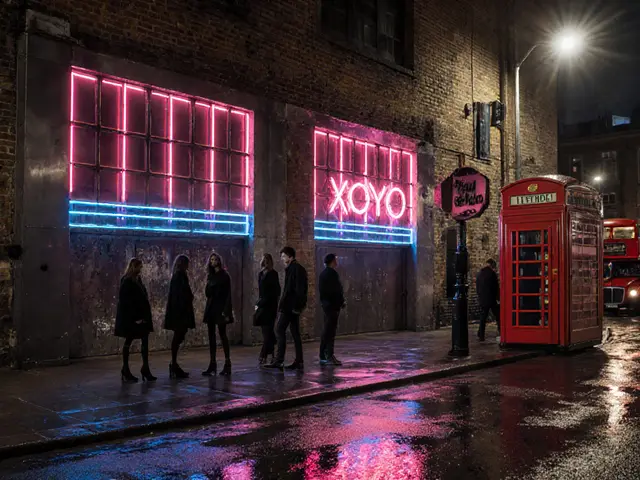Let’s cut the crap - when you walk into a massage studio in London and the therapist asks if you want ‘relaxation’ or ‘therapeutic’, they’re not asking about your mood. They’re asking if you want to feel like you’ve been hugged by a cloud… or like your muscles have been rearranged by a demolition crew. And if you’re reading this, you already know which one you’re here for.
What Is It, Really?
Massage therapy in London isn’t just rubbing oil on your back while someone hums Enya. It’s clinical. It’s evidence-based. It’s the reason your physiotherapist sends you here after your knee surgery, or why your CFO comes here every Tuesday to stop screaming into his coffee mug. This isn’t spa fluff. This is soft tissue manipulation backed by peer-reviewed studies from the Journal of Bodywork and Movement Therapies. You’re not getting a ‘treat’. You’re getting a reset.
Think of it like rebooting your body’s operating system. Your shoulders? Locked up from 12-hour Zoom calls. Your hips? Stiff from sitting in a taxi all day. Your lower back? Screaming because you carried a suitcase up three flights of stairs in Shoreditch. A good therapist doesn’t just press harder. They know exactly where the fascia’s stuck, which nerve’s firing wrong, and how to coax your nervous system from ‘fight or flight’ back to ‘chill the fuck out’.
How to Get It - No Bullshit Guide
You don’t just walk into a random place on Oxford Street and hope for the best. I’ve seen blokes do it. They end up with a 20-minute ‘relaxation’ session where the therapist chats about her cat the whole time. Waste of £80.
Here’s how you do it right:
- Go to TherapySpace London in Islington. Not the one with the pink lights. The one with the white walls, the quiet waiting room, and the therapist who doesn’t smile too much. That’s the one who knows what she’s doing.
- Book a 60-minute deep tissue or myofascial release session. Skip the ‘aromatherapy’ crap. You don’t need lavender. You need pressure.
- Arrive 10 minutes early. Don’t be late. These people have a schedule tighter than a London Tube during rush hour.
- Be honest. Tell them: ‘My right shoulder feels like it’s fused to my spine.’ Don’t say ‘I’m a bit tense.’ That’s not helpful.
- After? Drink water. Like, a litre. Your muscles are releasing toxins like a drained swamp.
Prices? £85 for 60 minutes. £120 for 90. Yeah, it’s steep. But compare it to a £600 physio bill or a £200 chiropractor visit that leaves you sore for three days. This? This is preventative. This is maintenance. This is what your body begs for after a week of London life.

Why Is It Popular? Because Londoners Are Broken
London doesn’t sleep. It just grinds. And its people? They’re cracked open like overcooked eggs. You’ve got bankers with rotator cuff injuries from typing. You’ve got delivery drivers with sciatica from riding scooters in the rain. You’ve got freelancers with neck pain from staring at laptops in coffee shops that charge £7 for a flat white.
Massage therapy here isn’t a luxury. It’s survival. I’ve been to clinics in Soho where guys in suits come straight from the City, strip to their boxers, lie down, and cry. Not because it hurts - because for the first time in weeks, they feel like a human again. Not a machine. Not a cog. Just flesh and blood that’s been given back its dignity.
And it’s not just men. Women come too. But you? You’re here because you’ve got a body that’s been treated like a taxi - driven hard, ignored, and never serviced.
Why Is It Better Than Anything Else?
You could go to a gym. You could take ibuprofen. You could stretch on YouTube. You could even try one of those vibrating foam rollers that cost £150 and sit in your flat collecting dust.
But none of that does what a trained therapist does.
They don’t just press. They listen. With their hands. They feel the difference between a muscle that’s tight from overuse and one that’s tight because it’s protecting a bad joint. They know the difference between tension from stress and tension from structural imbalance. They’ve seen 300 backs this month. They’ve seen yours before - and they know how to fix it.
And the best part? No one’s selling you a supplement. No one’s pushing a membership. No one’s asking you to download an app. It’s just you, a table, and someone who’s spent 1,200 hours learning how to make your body stop screaming.

What Kind of Emulsion Will I Get?
Let’s get real. You’re not here for a ‘zen experience’. You’re here for results. So here’s what you actually get:
- Immediate relief - Within 24 hours, your neck won’t feel like it’s holding a bowling ball.
- Long-term mobility - After 3 sessions, you’ll bend down to tie your shoes without groaning.
- Better sleep - Your body stops bracing. Your mind stops racing. You actually sleep through the night.
- Less painkillers - No more popping ibuprofen like M&Ms.
- Confidence - You stand taller. You move easier. You don’t flinch when someone touches your shoulder.
And yes - you might feel sore the next day. That’s not a bad sign. That’s your body waking up. Like a dog that’s been chained up for years and finally gets to run. It’s going to be uncomfortable. But it’s going to be worth it.
One guy I met at TherapySpace - a hedge fund manager from Mayfair - told me after his third session: ‘I didn’t know I could feel this good without drinking.’ That’s the truth. This isn’t about pleasure. It’s about reclaiming your body from the grind.
Final Word: Don’t Wait Until You’re Broken
London doesn’t wait for you to heal. It keeps moving. So why should you?
You don’t need to be in agony to get a massage. You just need to be tired. Tired of carrying stress in your shoulders. Tired of walking like an old man at 32. Tired of pretending your body isn’t falling apart.
Book the session. Show up. Lie down. Let someone else do the work. Your body’s been holding the weight. Now let it rest.
It’s not about sex. It’s not about fantasy. It’s about function. And in a city that runs on adrenaline, sometimes the most powerful thing you can do is just… stop.
Is massage therapy in London worth the cost?
Absolutely. A 60-minute session costs £85 - less than a weekend brunch for two. But unlike brunch, it fixes your body. Compare that to physio (£120 per session, often requiring 6+ visits) or chiropractic care (same price, same results). Massage therapy gives you faster relief, no needles, no X-rays, and no waiting months for NHS referrals. It’s preventative healthcare that actually works.
Do I need to undress completely?
No. You undress to your comfort level - boxers, shorts, or underwear. The therapist leaves the room while you get on the table. They drape you with towels, uncovering only the area they’re working on. You’re never exposed. It’s clinical, not creepy. If someone tries to be ‘friendly’ or asks you to ‘relax more’, walk out. That’s not therapy - that’s a red flag.
How often should I go?
If you’re in pain or recovering from injury: once a week for 3-4 weeks. If you’re just maintaining: every 3-4 weeks. Elite athletes go weekly. Office workers? Every 4-6 weeks is enough to stay ahead of the stiffness. Think of it like oil changes for your body. Skip it too long, and you’ll start rattling.
Are there any risks?
Only if you go to an unqualified person. Always check if the therapist is registered with the Complementary and Natural Healthcare Council (CNHC) or the Massage Therapy Association (MTA). Avoid places that don’t display credentials. Also - if you have osteoporosis, recent surgery, or blood clots, tell them upfront. Good therapists will adjust or refer you. Bad ones won’t ask.
Can I get a massage after drinking?
Don’t. Alcohol dehydrates you. Massage releases toxins. Combine the two, and you’ll feel like you’ve been hit by a bus - twice. Wait at least 12 hours after drinking. Better yet - skip the pints the night before and save your cash for the session. Your liver will thank you.





